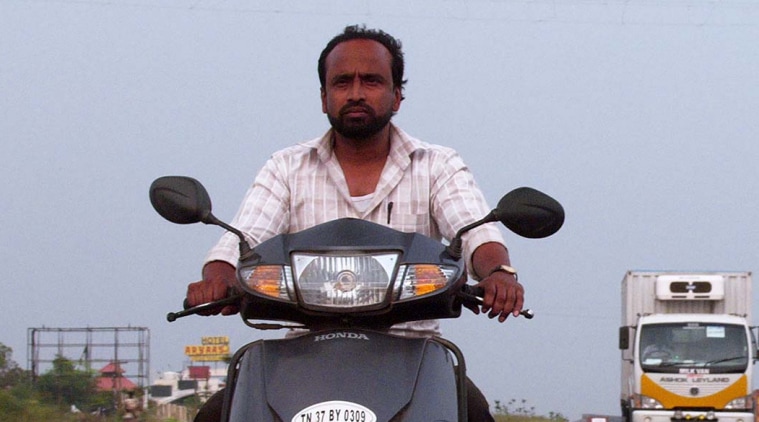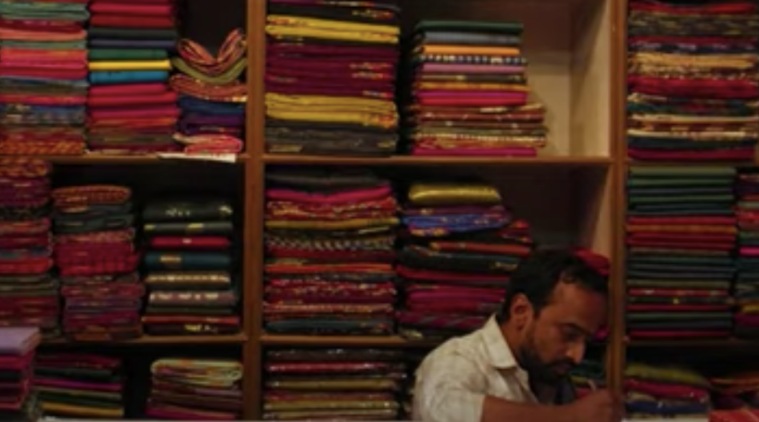 Nasir will play at The We Are One Global Film Festival. (Source: International Film Festival Rotterdam)
Nasir will play at The We Are One Global Film Festival. (Source: International Film Festival Rotterdam)
There is a brief moment in Arun Karthick’s topical Nasir which captures the terrifying nonchalance with which communal intolerance has percolated in regular conversations. A salesman is informed over the phone that a particular locality is not permitting a religious procession to pass through their street. “Throw stones at them,” he says dismissively, revealing his own leanings. But the scene achieves a lot more by the presence of Nasir (Koumarane Valavane), his Muslim colleague who listens but looks away. Expressing no shock or disgust, his face wears the dull cover of habit of having heard these words before. His silence indicates a resignation, telling of the many threats minorities have to constantly negotiate and live with.
As a salesman living with his family in Coimbatore, Nasir’s profession demands that he anticipates what others would like: the checked saris a pair of grandmothers visiting the store would prefer, the pink shirt he puts on the mannequin hoping the shade would attract others. But Karthick also depicts what Nasir is like by outlining a day in his life in intimate detail and documenting with sustained gentility the regulated pattern with which it unfolds: the eponymous protagonist waking up to the sound of azaan, taking bath in the common toilet, helping his wife with chores, dropping her off to the bus stop, visiting the mosque in the afternoon and tending to patrons at the textile showroom. This ordinariness also spills into his modest ambitions. As we follow him around, we are privy to his conversations and serve as the sole audience to the letter he writes to his absent wife. We learn about his poetic inclination, his deep love for his spouse and an equal bashfulness to express this, a possible financial crunch and plans to admit his ward to a special school.
Watch the trailer here.
Based on the short story, The Story Of A Clerk By Dilip Kumar, Nasir is the tale of an everyman, a symbolic clerk burdened by the anonymity of his position. Karthick delves deep into this template, providing us with a distinct face for the homogeneous clerk. But as he delineates Nasir’s life, the latter’s plight of not being with his wife for three days and eagerness on seeing her later, appear affecting but unexceptional. His worries regarding a sudden expense and his mother’s failing health seem generic. They stem from constrained circumstances shared by many.
But this generic texture of his struggle assumes specificity when religion takes precedence over everything else and irrevocably alters his life, when from being identified as a Muslim man his entire identity is reduced to that. The tragic eventuality Nasir suffers from pushes us to recognise the pervading and menacing nature of religion in the garb of faith. It urges us to re-identify the nature of his woes and question if that which were deemed secular spoils of life were in fact shaped by the status accorded to him by others: Was being denied an advance by his boss really a case of sluggish business or an instance of bias? Was his consideration to move to Abu Dhabi driven by the prospect of a better future or a safer one?
 Karthick places his protagonist at that juncture of history where religious bigotry has been sanctioned with a rare fervour.(Source: International Film Festival Rotterdam)
Karthick places his protagonist at that juncture of history where religious bigotry has been sanctioned with a rare fervour.(Source: International Film Festival Rotterdam)
In his sophomore outing — which premiered at the International Film Festival of Rotterdam and won the NETPAC Award for the best Asian production — Karthick refrains from mentioning the time period he sets his film in. Instead, he evokes it. As Nasir accompanies his wife to the bus stop, navigating narrow alleys and the crowd, noise from nearby loudspeakers spewing religious hate speech about invaders and migrants fills the air. Later, when his employer at the showroom is asked by an acquaintance to suggest an eatery, he launches into a list of restaurants with vivid detail, hurriedly picking on the exact texture and shape of food from different places. The scene is meant to be funny but the directive soon manoeuvres to people and prejudices. Along with the non-spicy sambar at one place, one must also avoid a dark skinned, bearded waiter with an “overpowering stench of sweat” at the other. Religion here has ceased to be followed by people. It now follows them around.
Hie places his protagonist is placed at that juncture of history where religious bigotry has been sanctioned with a rare fervour and secularism — like the presence of idols from different faiths at Nasir’s showroom — is reduced to a performance. Shot in 2018, the images and noises the film withholds cut too close to home. We regularly read about such Nasir(s) except their names are hidden behind statistics. The film throws the spotlight on one of them and underlines the fragility of their lives. It highlights the helplessness with which they are forced to turn a blind eye to every slight and jab and how close their feet are perpetually placed near a metaphorical sword. It also urgently proposes that their routine existence too makes for a compelling story and not just what becomes of it.
Nasir will play at The We Are One Global Film Festival on June 6 from 7 pm.